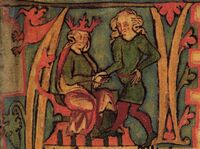Andesen of Flatstone: Difference between revisions
No edit summary |
No edit summary |
||
| Line 62: | Line 62: | ||
== Military Career and Campaigns == | == Military Career and Campaigns == | ||
=== First Stonish War of Unification === | === [[First Stonish War of Unification]] === | ||
==== Naval Competence and the Posukoşoti ==== | ==== Naval Competence and the Posukoşoti ==== | ||
| Line 69: | Line 69: | ||
==== Anti-Ou Sentiments ==== | ==== Anti-Ou Sentiments ==== | ||
=== Second Stonish War of Unification === | === [[Second Stonish War of Unification]] === | ||
==== Invasion of the Ou Clan ==== | ==== Invasion of the Ou Clan ==== | ||
Revision as of 15:01, 13 June 2022
King Bjarn Von Stone | |
|---|---|
 Illustration of Bjarn Von Stone supposedly in the Szlād Imperial Palace. | |
| Native name | Şotī Bjājn |
| Birth name | Bjarn Von Stone |
| Born | 16th June 1194 Suntugā, Flatstone |
| Died | 23rd August 1237 Vedotī, Flatstone |
| Buried | Suntugā, Flatstone |
| Allegiance | |
| Rank | Commander in Chief |
| Battles/wars |
|
| Spouse(s) | Edna Von Stone |
| Children | Eirik Von Stone |
| Relations | Northern Ivili Clan |
Bjarn Von Stone was born just one year before the ceasefire. He had been born into an isolated farmhouse somewhere in Suntugā, supposedly growing up with his mother and potentially his father, although it should be noted that his mother was believed to have been widowed. Not a lot is known about Bjarn's childhood and his progression into adulthood, but what is certain is that Von Stone was a name that he gave to himself, and his original last name is unknown. It is likely that Bjarn taught himself archery and swordsmanship at a young age, as by the time the First Stonish War of Unification broke out in 1211 his performance in battle and leadership was reportedly "excellent". Bjarn left for the capital of Vedotī at age fourteen in order to find work and make money, however rather then starting a farm of his own or participating as an architect, Bjarn would be quick to find his way into the politics of Northern Ivili, establishing himself as the self-proclaimed successor of Erik Slaten at the age of 17 and taking after his beliefs and accomplishments, using religion as a tool to seize and maintain power through authoritarian means. By the time he was 18, the civil war was in full swing and Bjarn had couped the remnants of Northern Ivili in the same fashion as Erik Slaten had a century prior.